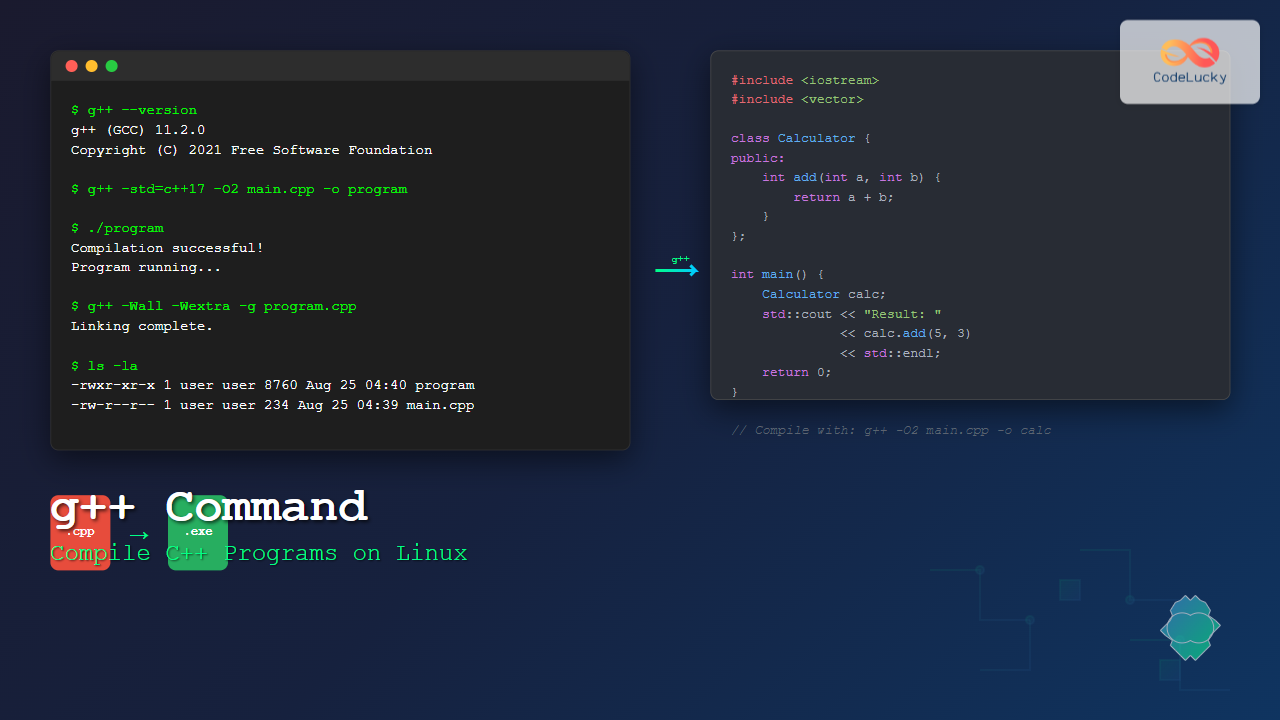In the world of C++ programming, constructors play a crucial role in object initialization. As your classes become more complex, you might find yourself repeating code across multiple constructors. This is where delegating constructors, also known as constructor chaining, come to the rescue. Introduced in C++11, this feature allows one constructor to call another constructor of the same class, promoting code reuse and maintainability.
Understanding Delegating Constructors
Delegating constructors provide a way for one constructor to invoke another constructor in the same class. This mechanism allows you to centralize common initialization code, reducing redundancy and potential errors.
Let's dive into a simple example to illustrate this concept:
class Rectangle {
private:
double length;
double width;
public:
// Main constructor
Rectangle(double l, double w) : length(l), width(w) {
std::cout << "Main constructor called" << std::endl;
}
// Delegating constructor
Rectangle() : Rectangle(1.0, 1.0) {
std::cout << "Delegating constructor called" << std::endl;
}
void display() {
std::cout << "Length: " << length << ", Width: " << width << std::endl;
}
};
In this example, we have two constructors:
- The main constructor
Rectangle(double l, double w)initializes thelengthandwidthmembers. - The delegating constructor
Rectangle()calls the main constructor with default values.
Let's see how these constructors work in action:
int main() {
Rectangle r1;
r1.display();
Rectangle r2(5.0, 3.0);
r2.display();
return 0;
}
Output:
Main constructor called
Delegating constructor called
Length: 1, Width: 1
Main constructor called
Length: 5, Width: 3
🔍 Notice how the delegating constructor calls the main constructor before executing its own body. This ensures that the object is fully initialized before any additional operations are performed.
Benefits of Delegating Constructors
- Code Reuse: By centralizing initialization logic, you avoid duplicating code across multiple constructors.
- Maintainability: Changes to initialization logic need to be made in only one place, reducing the chance of errors.
- Clarity: Delegating constructors make the relationship between different initialization methods more explicit.
Advanced Usage of Delegating Constructors
Let's explore a more complex example to showcase the power of delegating constructors:
class Person {
private:
std::string name;
int age;
std::string address;
public:
// Main constructor
Person(const std::string& n, int a, const std::string& addr)
: name(n), age(a), address(addr) {
std::cout << "Main constructor called" << std::endl;
}
// Delegating constructor with default address
Person(const std::string& n, int a)
: Person(n, a, "Unknown") {
std::cout << "Constructor with default address called" << std::endl;
}
// Delegating constructor with default age and address
Person(const std::string& n)
: Person(n, 0) {
std::cout << "Constructor with default age and address called" << std::endl;
}
void display() {
std::cout << "Name: " << name << ", Age: " << age << ", Address: " << address << std::endl;
}
};
In this example, we have three constructors:
- The main constructor initializes all members.
- The second constructor delegates to the main constructor with a default address.
- The third constructor delegates to the second constructor with a default age.
Let's see how these constructors work:
int main() {
Person p1("Alice", 30, "123 Main St");
p1.display();
Person p2("Bob", 25);
p2.display();
Person p3("Charlie");
p3.display();
return 0;
}
Output:
Main constructor called
Name: Alice, Age: 30, Address: 123 Main St
Main constructor called
Constructor with default address called
Name: Bob, Age: 25, Address: Unknown
Main constructor called
Constructor with default address called
Constructor with default age and address called
Name: Charlie, Age: 0, Address: Unknown
🔍 Observe how the constructors chain together, each adding its own layer of default values or processing.
Best Practices for Delegating Constructors
-
Avoid Circular Dependencies: Ensure that your constructor chain doesn't create a circular dependency, as this will result in a compilation error.
-
Keep It Simple: While delegating constructors can simplify your code, overusing them can lead to complex initialization flows that are hard to understand.
-
Use Default Arguments When Appropriate: In some cases, using default arguments in a single constructor might be clearer than creating multiple delegating constructors.
-
Consider Performance: Remember that each delegated constructor call adds a small overhead. In performance-critical code, you might want to avoid excessive delegation.
Delegating Constructors vs. Default Arguments
While delegating constructors and default arguments can sometimes achieve similar results, they have different use cases. Let's compare:
class Example {
private:
int x;
int y;
public:
// Using default arguments
Example(int a = 0, int b = 0) : x(a), y(b) {
std::cout << "Constructor with default arguments called" << std::endl;
}
// Using delegating constructors
Example() : Example(0, 0) {
std::cout << "Delegating constructor called" << std::endl;
}
void display() {
std::cout << "x: " << x << ", y: " << y << std::endl;
}
};
When to use each:
- Default Arguments: When you want to provide default values for parameters and the initialization logic is simple.
- Delegating Constructors: When you need to perform additional operations in certain constructors or when the initialization logic is complex.
Real-World Scenario: Database Connection Class
Let's look at a practical example where delegating constructors can be particularly useful:
class DatabaseConnection {
private:
std::string host;
int port;
std::string username;
std::string password;
bool useSSL;
void connect() {
// Simulating database connection
std::cout << "Connecting to " << host << ":" << port
<< " as " << username
<< (useSSL ? " with SSL" : " without SSL") << std::endl;
}
public:
// Main constructor
DatabaseConnection(const std::string& h, int p, const std::string& u,
const std::string& pwd, bool ssl)
: host(h), port(p), username(u), password(pwd), useSSL(ssl) {
connect();
}
// Delegating constructor with default port and SSL setting
DatabaseConnection(const std::string& h, const std::string& u, const std::string& pwd)
: DatabaseConnection(h, 3306, u, pwd, true) {
std::cout << "Using default port and SSL settings" << std::endl;
}
// Delegating constructor for local development
DatabaseConnection()
: DatabaseConnection("localhost", "dev_user", "dev_password") {
std::cout << "Using local development settings" << std::endl;
}
};
In this example, we have a DatabaseConnection class with three constructors:
- The main constructor that takes all parameters.
- A constructor that uses default values for port and SSL settings.
- A constructor for local development that uses predefined values.
Let's see how these constructors can be used:
int main() {
DatabaseConnection prod("db.example.com", 5432, "admin", "secure_pass", false);
DatabaseConnection staging("staging.example.com", "stg_user", "stg_pass");
DatabaseConnection local;
return 0;
}
Output:
Connecting to db.example.com:5432 as admin without SSL
Connecting to staging.example.com:3306 as stg_user with SSL
Using default port and SSL settings
Connecting to localhost:3306 as dev_user with SSL
Using default port and SSL settings
Using local development settings
🔍 This example demonstrates how delegating constructors can provide flexibility in object initialization while maintaining a clean and maintainable codebase.
Limitations and Considerations
While delegating constructors are powerful, they do have some limitations:
-
No Virtual Constructors: C++ doesn't support virtual constructors, so you can't use polymorphism with delegating constructors.
-
Initialization Order: Member initializers in the delegating constructor's member initializer list are ignored. Only the target constructor's initializers are used.
-
Performance Overhead: Each delegation adds a small performance cost. In most cases, this is negligible, but it's worth considering in performance-critical code.
-
Complexity: Overuse of delegating constructors can lead to complex initialization flows that are hard to follow.
Conclusion
Delegating constructors in C++ provide a powerful mechanism for creating flexible and maintainable object initialization code. By allowing constructors to call other constructors within the same class, you can centralize common initialization logic, reduce code duplication, and create clear hierarchies of object construction.
Whether you're working on a small project or a large-scale application, understanding and effectively using delegating constructors can significantly improve your C++ code's clarity and maintainability. As with any programming feature, it's important to use delegating constructors judiciously, always considering the specific needs and constraints of your project.
By mastering delegating constructors, you add another valuable tool to your C++ programming toolkit, enabling you to write more efficient, readable, and robust code.

















